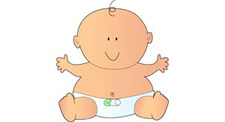Overweight Baby

Tips for Preventing an Overweight Baby
Everyone has a relative, maybe a grandmother or aunt, who loves to pinch the fat on an overweight baby and go on and on about how cute he or she is. And, while all babies are cute and for many, being an overweight baby is only a passing phase, for many it can be the very early start of what might become a lifetime fight with obesity.
The definition of an overweight baby is any infant who is gaining weight faster than he or she is growing in height. The last thing you want to do is reach a point where a child is becoming so overweight that he or she needs to go on a diet at a young age. Weight can be even more of a problem if there is a hereditary tendency in the family towards obesity.
If you are a mother, you can make certain choices early on to keep your overweight baby from remaining overweight and having to possibly battle weight problems for his or her entire life. The first tip to prevent a baby from becoming overweight is to breastfeed your child. Research studies show overwhelmingly that bottle-fed babies gain more weight than breastfed babies.
Wait until you know your baby is hungry before feeding him. Many times a mother will let her baby graze, which means feeding too frequently. Sometimes babies will feed as much as once an hour. This is a process which can lead to an overweight baby. The solution means waiting until your baby is really hungry before feeding him or her. This means being patient and not giving your child a bottle or breastfeeding when he demands it or just to keep him quiet.
Psychologists say that when babies are given the chance to eat whenever they are upset and crying, this leads to an adult behavior of eating whenever they get stressed. This is one of the reasons that many adults are overweight and cannot lose weight. The practice of giving your baby a bottle to carry around with him is also not a good practice. Wait until the child is hungry and then feed the appropriate amount of milk or food.
When breastfeeding, your baby will stop when he or she is full. So, if you are feeding formula in a bottle, you should stop when your baby stops wanting more milk. It is not good to do what many mothers do and keep at it until their infant finishes the entire bottle. Plus, a baby knows when he or she is full and will stop sucking. Unless your infant is very much underweight, never force him to eat more than he wants.
Believe it or not, the eating habits which are allowed when you are a baby can turn into lifetime eating problems when it comes to weight gain. Eating the right amount and the right foods are practices which need to begin when children are young. Then they have much more of a chance of being continued for a lifetime.
Many times an overweight baby will have been given a bottle just for comfort. Crying in the middle of the night is annoying--it’s easier to give a bottle than to stay up for several hours until baby falls back to sleep naturally. When babies first come home from the hospital they should be eating no more than every two hours. Children in the two to six months range, only need to be fed as often as every three hours.
The frequent cause of an overweight baby is giving too much solid food too soon. If you are breastfeeding, wait till your baby is six months old before starting on solid food. Also wean your child by the time he or she is one year old. Doctors who do research on babies have found breastfeeding beyond one year more often than not leads to not just being a little overweight but to obesity in children and adults.
With so many people becoming obese these days, it is more important than ever to manage how much and when you feed your baby. Good nutritional habits that start in childhood are likely to carry over into adulthood.